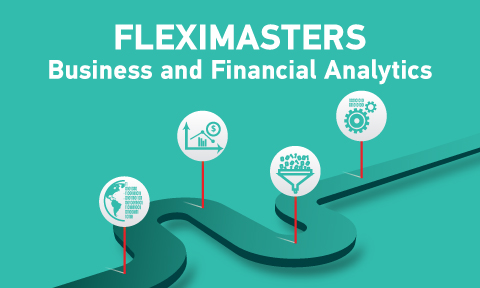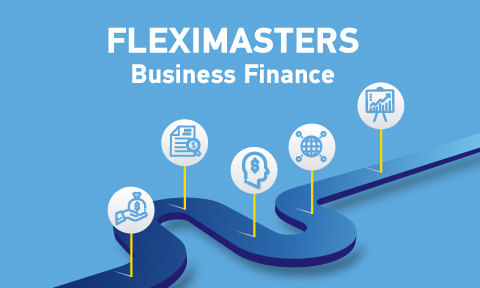Introduction
The FlexiMasters in Business Finance is suitable for participants interested in finance but who had a minimal exposure to this field at the tertiary level. A sequence of five graduate courses will give participants a broad exposure to financial topics including financial management (corporate finance), Investments, and newer topics such as fintech and sustainable finance.
FlexiMasters in Business Finance is offered at Nanyang Business School as part of the FlexiMasters series launched by Nanyang Technological University, Singapore (NTU Singapore).
Objectives
- Provide learners with better access to Postgraduate level training so that they can upskill/reskill with a personalised learning pathway.
- Enable adult learners to build on their experience, transit and prepare for career shifts and become future-ready amidst fast-changing employment market.
- Credits earned can be stacked towards postgraduate degrees at NBS.
Outline
| Module | Objective |
|---|---|
| The objective of this course is to provide a broad understanding of key financial principles, concepts, and analytical tools. The topics to be covered include the time value of money, bond and stock valuation, capital budgeting, risk and return,
cost of capital, corporate financial decisions (capital structure, dividend distribution policy and capital raising), and an introduction to options. It is a necessary first foundation course in finance. |
| The course aims to equip students with accounting skills and knowledge essential for understanding and analysing financial statements for business decisions. Students will learn the concepts and applications of financial accounting standards
on key economic transactions of the reporting entity so that they can interpret and analyse financial statements. These transactions include complex scenarios that involve financial instruments, impairment, leases, and income taxes.
|
| This course provides a rigorous introduction to the fundamentals of modern finance and their applications to business challenges in investment. Models of investment are at the heart of every investment decision, whether that decision is to buy, sell, or hold. Due to the globalization process and ever-changing dynamics of the modern financial markets, the pricing of any financial asset has become a more complex task. This course will guide students through the theory and application of several main topics of investment and highlights the strengths and weaknesses of each valuation model. Students will learn valuation, portfolio construction and evaluation techniques, and apply investment techniques using EXCEL. The main topics are: (A) an introduction to asset classes and financial instruments, and how to trade financial securities; (B) risk and return, capital allocation decisions; (C) Modern portfolio theory, the Capital Asset Pricing Model
(CAPM), Arbitrage Pricing Theory (APT), and Multi-factor models; (D) performance evaluation of mutual funds and other portfolios. |
| This course is an introduction to international economics and finance. It serves to introduce decision-makers in the managerial and business profession to modern economic and financial theories and models. These theories and models shed
light on economic issues that impinge on the performance of business and industrial enterprises that operate in a competitive international setting. In this course, we will describe the global financial markets that facilitate international business and explain the key economic linkages among them. In the context of international finance, understanding foreign exchange rates is crucial. We will therefore explain exchange rates and those factors that affect the rates. We will then examine the challenges for companies created by unexpected changes in exchange rates. We will also discuss how these firms should manage their exposure to currency fluctuations. Lastly, we will explore areas of international corporate finance like capital budgeting and financing from the perspective of multinational companies. Students who attend this course will be prepared for rewarding careers providing advice, analysis, creative insights and solutions in economics, finance and business. They may work as an economist, business analyst/consultant, financial/risk
analyst, or policy development officer; or they may choose to pursue graduate studies in economics, business, or professional designation in finance (e.g. CFA) or accounting (e.g. CPA). |
| In recent years, the development of Fintech, especially the application of blockchain and AI in finance, has attracted tremendous attention from both industry and academia. Fintech is considered as the core competitiveness by financial
institutions. This course will not only cover the basic knowledge, but also teach skills of developing new applications. It lays the foundation for more advanced courses and helps students get prepared for a career in the FinTech industry.
You will learn the basics of blockchain and AI technologies and related practical topics, such as CBDC, crypto economics, digital asset management. You will also learn how to use open-source Python packages to design, test, and implement
algorithms in finance. This course is the study of finance and sustainability as an integrated subject beginning with an introduction of financial and investment principles and moving towards financial analysis, financing, valuation, responsible investment and
impact investing. The course covers diverse aspects of sustainable investments and offers tools for effective financial valuation and effective risk assessment. The perspective proposed by this course is motivated by the desire of
corporations for continued prosperity, expansion and in some cases even to promote their own survival. |
Fees and Funding
Standard Course Fee: S$$20,000 (Before GST)
| Course Fees in SGD | ||
|---|---|---|
| Fees BEFORE funding & GST | Fees AFTER funding & 9% GST | |
| Singapore Citizens (aged 21-39) / PR (aged ≥21) 70% Funding | $20,000.00 | $6,540.00 |
| Singapore Citizens (aged ≥40) MCES1 - up to 90% | $20,000.00 | $2,540.00 |
| SME-sponsored Singapore Citizens / PR ETSS2 - up to 90% | $20,000.00 | $2,540.00 |
| NTU Alumni Fee payable after 70% SSG Funding and use of $1,600 **NTU Alumni Course Credits | $20,000.00 | $6,016.80 |
1. Under the SkillsFuture Mid-career Enhanced Subsidy (MCES) scheme. For more information, visit the SkillsFuture website here.
2. Under
the Enhanced Training Support for Small & Medium Enterprises (ETSS) scheme. For more information, click here.
Singapore Citizens, aged 25 and above, and self-sponsored, may use their SkillsFuture Credit to defray full or part of the nett course fee.
Singapore Citizens, aged 40 and above, and self-sponsored, may use their NEW Top-up of $4,000 SkillsFuture Credit (Mid-Career) to defray full or part of the nett course fee only for FlexiMasters courses that can be stacked into the respective Master’s programme.
You can submit your SkillsFuture Credit claims by logging into MySkillsFuture.sg. Please click here for “How do I submit a claim for SkillsFuture credit?” and other FAQs.
Funding Requirements
- Participant must achieve a minimum of 75% attendance for each module.
- Participant must complete and pass all assessment components.
Participants will be invoiced the net amount after funding and GST.
**NTU Alumni Course Credits
All self-sponsored NTU/NIE alumni may utilise their alumni credits of $1,600 to co-pay up to 50% of the nett fee (exclusive of prevailing GST) payable for courses offered by NTU-Continuing Education
Training (CET) Units. It is participant’s responsibility to inform if you wish to utilize alumni credits before the start of the programme. For more info, please click here.
Recommended Add-Ons
 | FlexiMasters in Business and Financial Analytics FlexiMasters in Business and Financial Analytics equips participants to excel in the domain of business analytics and analytics used in the financial services industry. Participants will learn skills necessary to guide businesses through today’s environment of digital disruption and transformation. |
 | FlexiMasters in Marketing in a Digital World The FlexiMasters in Marketing in a Digital World is designed to help marketers succeed in this digital age. The program will equip you with the fundamental marketing knowledge and important analytic and digital marketing skills to meet industry demands in this age of complexity. |
 | FlexiMasters in General Management This program aims at equipping participants with skills necessary to run modern enterprises. The five-course sequence will focus on key aspects of business strategy, people management, operations, company governance, cultural intelligence and business negotiation. |



 Financial Statement Analysis
Financial Statement Analysis Investments
Investments International Economics and Finance
International Economics and Finance Contemporary Finance: Fintech and Sustainable Finance
Contemporary Finance: Fintech and Sustainable Finance
.png?sfvrsn=25651bb_0)

